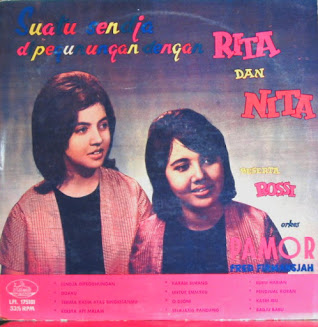Another record produced in Nederland, approx. in 1967.
This country lost the colony named Indie, which became Indonesia in 1945.
Thousands of Dutchmen, persons of mixed blood, and others who were attached to them left the new republic. And went to Holland.
Many settled in The Hague city. In old mansions who had seen better times and were divided into apartments for the "Indo's.
The Hague, where most of the year the cold sea-wind is blowing through the deserted avenues.
Lots of parks and and age-less ladies chatting in tea-rooms, the last stand you could see them still wearing hats and drinking tea with their little finger in the air, exchanging the latest society-gossips. In such a city many Indo's lived, the hallways and stairways of their apartments smelling of trasi or their other Indonesian cookings. Nowadays The Hague became alive and many indo's left the city and dispersed all over The Netherlands, may headed for California because the found Holland a too packed with no room to move.
The elderly people still dreaming about the past and their kroncong music, as you can hear from this music.
The younger generation adapted fast to the Duch lifestyle and music. kroncong music was for the elderly people.
If you meet such a person from the 3rd of 4th generation in Holland, they cannot speak "Maleis" anymore but all know the names of all those Indonesian dishes.
Songs:
"Suling Bambu": - Bamboo flute-
"Kroncong Kemayoran" - Kroncong from Kemayoran - A neighbourhood in Jakarta where many Indo's were dwelling. This song is also fine for parties and birthdays, because the lyrics can be changed easily, depending on the occasion. shouting of "hoi" at the right moment, which can be ruined by the consumption of too much alcohol.
"Terkenang Kenang" - left memories -
"Kroncong Nachtsirenen" - Kroncong of the night Sirenes - What is a Sirene? maybe you know already. Imagine: You walk in the woods, at night,
Then suddenly you hear a girl's voice: Come here! with beautiful singing. You proceed further into this forest following her sweet voice, which appears close already, and then more far away. At last you lose all sense of direction and end up drowning in a swamp.
"Stambul Dasimah" A Stambul is a kind of street theatre, its set up is like the Chinese street opera, but with other costumes and stories from the Malay, Persian, and European scene. Its audience people who lived in the areas inbetween the European and the indigenous groups.
It is a story about Dasimah and in the song you can hear the comments by the audience who were always very involved with the play.
A girl in the audience is with Leo, saying: "Wat wil je toch worden, Leo" In Indonesian-Dutch: "What are you up to, Leo" ( Maybe Leo is taking advantage of the darkness ) In standard Dutch "Wat wil je toch worden" means: What do you want to become? and so if Leo was a freshly arrived Dutchman he would have answered: "O, maybe a doctor or a lawyer" ( It originates from: "Mau jadi apa, Leo?" )
"Gelang Si Paku Gelang" Difficult to translate in many songs sweet gentle words are put together like beads on a necklace.
" Kroncong Telomoyo " refers to the Telomoyo mountain
"Putri Solo" -Girl from Solo-
"Kroncong Bandan" -Kroncong from Bandan- Maybe kampung Bandan in North Jakarta
"Stambul Ombak Laut" -Stambul about the waves of the sea - Maybe at such Stambul play they use sea-waves made of colored carton, shaped like big saw-blades, which were pulled from left to right on the stage, by invisible stage-
Suling Bambu Miss Toeti
Kroncong Kemayoran Leo Spel
Terkenang Kenang Miss Toeti
Krontjong Nachtsirenen Guus Becker
Stambul Dasimah Leo Spel
Gelang Si Paku Gelang Guus Becker
Kroncong Telomoyo Leo Spel
Putri Solo Miss Toeti
Kroncong Bandan Guus Becker
Stambul Ombak Laut Leo Spel



